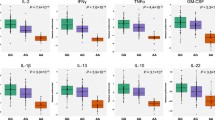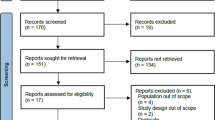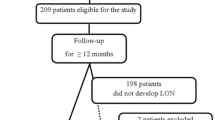Abstract
An association between FCGR3A-158 V/F polymorphism and biological responses to infliximab has been reported in Crohn’s disease (CD) in Western countries. However, little is known about the mechanism by which gene polymorphism affects the responses to infliximab. The aims of this study were to confirm the association in Japanese CD patients and to reveal the effect of gene polymorphism on biological responses to infliximab. Japanese CD patients were examined retrospectively at weeks 8 and 30. Clinical and biological responses were assessed by the Crohn’s disease activity index and C-reactive protein levels, respectively. The infliximab-binding affinity of natural killer (NK) cells from FCGR3A-158 V/V, V/F and F/F donors was examined. Infliximab-mediated antibody-dependent cell-mediated cytotoxicity (ADCC) activities were also determined using transmembrane TNF-α-expressing Jurkat T cells as target cells and peripheral blood mononuclear cells (PBMCs) from V/V, V/F and F/F donors as effector cells. Biological responses at week 8 were statistically higher in V/V patients, whereas no significant differences were observed in either clinical responses at weeks 8 and 30 or biological responses at week 30 among the three genotypes. NK cells and PBMCs from V/V patients also showed higher infliximab-binding affinity and infliximab-mediated ADCC activity, respectively. Our results suggest that FCGR3A-158 polymorphism is a predicting factor of biological responses to infliximab in the early phases. FCGR3A-158 polymorphism was also found to affect the infliximab-binding affinity of NK cells and infliximab-mediated ADCC activity in vitro, suggesting that an effect on ADCC activity influences biological responses to infliximab in CD patients.



Similar content being viewed by others
References
Canete JD, Suarez B, Hernandez MV, Sanmarti R, Rego I, Celis R, Moll C, Pinto JA, Blanco FJ, Lozano F (2009) Influence of variants of Fc gamma receptors IIA and IIIA on the American College of Rheumatology and European League Against Rheumatism responses to anti-tumour necrosis factor alpha therapy in rheumatoid arthritis. Ann Rheum Dis 68:1547–1552
Cartron G, Dacheux L, Salles G, Solal-Celigny P, Bardos P, Colombat P, Watier H (2002) Therapeutic activity of humanized anti-CD20 monoclonal antibody and polymorphism in IgG Fc receptor FcgammaRIIIa gene. Blood 99:754–758
Clynes RA, Towers TL, Presta LG, Ravetch JV (2000) Inhibitory Fc receptors modulate in vivo cytotoxicity against tumor targets. Nat Med 6:443–446
Congy-Jolivet N, Bolzec A, Ternant D, Ohresser M, Watier H, Thibault G (2008) Fc gamma RIIIa expression is not increased on natural killer cells expressing the Fc gamma RIIIa-158 V allotype. Cancer Res 68:976–980
Dall'Ozzo S, Tartas S, Paintaud G, Cartron G, Colombat P, Bardos P, Watier H, Thibault G (2004) Rituximab-dependent cytotoxicity by natural killer cells: influence of FCGR3A polymorphism on the concentration–effect relationship. Cancer Res 64:4664–4669
Feldmann M, Maini RN (2001) Anti-TNF alpha therapy of rheumatoid arthritis: what have we learned? Annu Rev Immunol 19:163–196
Harashima S, Horiuchi T, Hatta N, Morita C, Higuchi M, Sawabe T, Tsukamoto H, Tahira T, Hayashi K, Fujita S, Niho Y (2001) Outside-to-inside signal through the membrane TNF-alpha induces E-selectin (CD62E) expression on activated human CD4+ T cells. J Immunol 166:130–136
Hatjiharissi E, Xu L, Santos DD, Hunter ZR, Ciccarelli BT, Verselis S, Modica M, Cao Y, Manning RJ, Leleu X, Dimmock EA, Kortsaris A, Mitsiades C, Anderson KC, Fox EA, Treon SP (2007) Increased natural killer cell expression of CD16, augmented binding and ADCC activity to rituximab among individuals expressing the Fc{gamma}RIIIa-158 V/V and V/F polymorphism. Blood 110:2561–2564
Koene HR, Kleijer M, Algra J, Roos D, von dem Borne AE, de Haas M (1997) Fc gammaRIIIa-158 V/F polymorphism influences the binding of IgG by natural killer cell Fc gammaRIIIa, independently of the Fc gammaRIIIa-48 L/R/H phenotype. Blood 90:1109–1114
Louis E, El Ghoul Z, Vermeire S (2004) Dall'Ozzo, S., Rutgeerts, P., Paintaud, G., Belaiche, J., De Vos, M., Van Gossum, A., Colombel, J. F., and Watier, H.: Association between polymorphism in IgG Fc receptor IIIa coding gene and biological response to infliximab in Crohn's disease. Aliment Pharmacol Ther 19:511–519
Louis EJ, Watier HE, Schreiber S, Hampe J, Taillard F, Olson A, Thorne N, Zhang H, Colombel JF (2006) Polymorphism in IgG Fc receptor gene FCGR3A and response to infliximab in Crohn's disease: a subanalysis of the ACCENT I study. Pharmacogenet Genomics 16:911–914
Maini R, St Clair EW, Breedveld F, Furst D, Kalden J, Weisman M, Smolen J, Emery P, Harriman G, Feldmann M, Lipsky P (1999) Infliximab (chimeric anti-tumour necrosis factor alpha monoclonal antibody) versus placebo in rheumatoid arthritis patients receiving concomitant methotrexate: a randomised phase III trial. ATTRACT Study Group. Lancet 354:1932–1939
Mitoma H, Horiuchi T, Tsukamoto H, Tamimoto Y, Kimoto Y, Uchino A, To K, Harashima S, Hatta N, Harada M (2008) Mechanisms for cytotoxic effects of anti-tumor necrosis factor agents on transmembrane tumor necrosis factor alpha-expressing cells: comparison among infliximab, etanercept, and adalimumab. Arthritis Rheum 58:1248–1257
Mossner R, Schon MP, Reich K (2008) Tumor necrosis factor antagonists in the therapy of psoriasis. Clin Dermatol 26:486–502
Present DH, Rutgeerts P, Targan S, Hanauer SB, Mayer L, van Hogezand RA, Podolsky DK, Sands BE, Braakman T, DeWoody KL, Schaible TF, van Deventer SJ (1999) Infliximab for the treatment of fistulas in patients with Crohn's disease. N Engl J Med 340:1398–1405
Sfikakis PP, Theodossiadis PG, Katsiari CG, Kaklamanis P, Markomichelakis NN (2001) Effect of infliximab on sight-threatening panuveitis in Behcet's disease. Lancet 358:295–296
Targan SR, Hanauer SB, van Deventer SJ, Mayer L, Present DH, Braakman T, DeWoody KL, Schaible TF, Rutgeerts PJ (1997) A short-term study of chimeric monoclonal antibody cA2 to tumor necrosis factor alpha for Crohn's disease. Crohn's Disease cA2 Study Group. N Engl J Med 337:1029–1035
Tracey D, Klareskog L, Sasso EH, Salfeld JG, Tak PP (2008) Tumor necrosis factor antagonist mechanisms of action: a comprehensive review. Pharmacol Ther 117:244–279
Tsukahara S, Ikari K, Sato E, Yamanaka H, Hara M, Tomatsu T, Momohara S, Kamatani N (2008) A polymorphism in the gene encoding the Fcgamma IIIA receptor is a possible genetic marker to predict the primary response to infliximab in Japanese patients with rheumatoid arthritis. Ann Rheum Dis 67:1791–1792
Tutuncu Z, Kavanaugh A, Zvaifler N, Corr M, Deutsch R, Boyle D (2005) Fcgamma receptor type IIIA polymorphisms influence treatment outcomes in patients with inflammatory arthritis treated with tumor necrosis factor alpha-blocking agents. Arthritis Rheum 52:2693–2696
Vance BA, Huizinga TW, Wardwell K, Guyre PM (1993) Binding of monomeric human IgG defines an expression polymorphism of Fc gamma RIII on large granular lymphocyte/natural killer cells. J Immunol 151:6429–6439
Weng WK, Levy R (2003) Two immunoglobulin G fragment C receptor polymorphisms independently predict response to rituximab in patients with follicular lymphoma. J Clin Oncol 21:3940–3947
Wu J, Edberg JC, Redecha PB, Bansal V, Guyre PM, Coleman K, Salmon JE, Kimberly RP (1997) A novel polymorphism of FcgammaRIIIa (CD16) alters receptor function and predisposes to autoimmune disease. J Clin Invest 100:1059–1070
Zalevsky J, Leung IW, Karki S, Chu SY, Zhukovsky EA, Desjarlais JR, Carmichael DF, Lawrence CE (2009) The impact of Fc engineering on an anti-CD19 antibody: increased Fcgamma receptor affinity enhances B-cell clearing in nonhuman primates. Blood 113:3735–3743
Author information
Authors and Affiliations
Corresponding author
Additional information
An erratum to this article is available at http://dx.doi.org/10.1007/s00251-015-0861-2.
Rights and permissions
About this article
Cite this article
Moroi, R., Endo, K., Kinouchi, Y. et al. FCGR3A-158 polymorphism influences the biological response to infliximab in Crohn’s disease through affecting the ADCC activity. Immunogenetics 65, 265–271 (2013). https://doi.org/10.1007/s00251-013-0679-8
Received:
Accepted:
Published:
Issue Date:
DOI: https://doi.org/10.1007/s00251-013-0679-8




